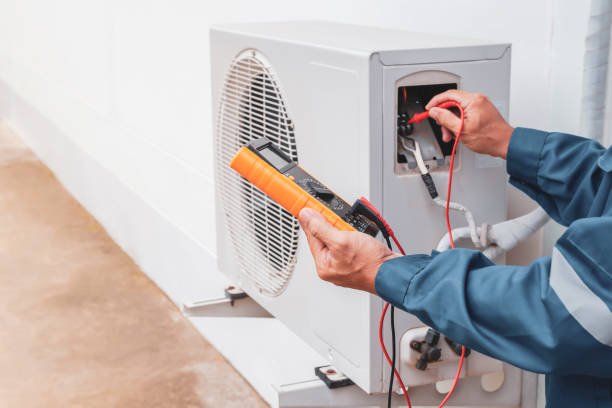How Much Does the Average HVAC Job Cost?
Introduction
When it comes to maintaining a comfortable indoor environment, nothing beats the efficiency of a heating, ventilation, and air conditioning (HVAC) system. But one question that looms large for homeowners and business proprietors alike is: How much does the average HVAC job cost? Understanding the financial aspects of HVAC services is crucial for making informed decisions about installation, maintenance, and repairs.

In this comprehensive article, we’ll delve deep into the various costs associated with HVAC jobs. We’ll cover everything from installation prices to routine maintenance expenses, give you insight into how to find competitive quotes from reputable HVAC companies near me, and equip you with the knowledge to make the best choices for your specific needs.
Whether you're looking to install a new system or service an existing one, this guide aims to provide clarity and help you navigate the often confusing world of HVAC costs.
Understanding HVAC Systems: An Overview
What is an HVAC System?
An HVAC system comprises several components designed to provide heating, cooling, and ventilation in residential and commercial spaces. These systems help maintain indoor comfort by regulating temperature and air quality.
Key Components of an HVAC System
Types of HVAC Systems
- Central Air Conditioning
- Ductless Mini-Split Systems
- Heat Pumps
- Furnaces
Understanding these components will help clarify why costs can vary so widely when it comes to servicing or installing these systems.
How Much Does the Average HVAC Job Cost?
Installation Costs: What Should You Expect?
The cost of installing a new HVAC system can range from $3,000 to $10,000 on average, depending on various factors such as:
- The size of your home
- The type of system you choose
- Labor costs in your area
Factors Influencing Installation Costs
Average Cost Breakdown by System Type
| System Type | Average Cost | |---------------------------|-------------------| | Central Air Conditioning | $3,500 - $7,500 | | Ductless Mini-Split | $2,000 - $5,000 | | Heat Pump | $4,000 - $8,000 | | Furnace | $2,500 - $6,000 |
This table gives you a rough idea of what you might expect when considering different types of systems.
Maintenance Costs for Your HVAC System
Routine Maintenance: Why It Matters?
Regular maintenance is essential for keeping your HVAC system running efficiently. Neglecting maintenance can lead to costly repairs down the line.
Typical Maintenance Services Include:
- Filter replacements
- Annual inspections
- Duct cleaning
- Refrigerant checks
Cost of Routine Maintenance Services
On average, homeowners should budget between $150 and $300 annually for routine maintenance services.
Factors Affecting Maintenance Costs
HVAC Repair Costs: What You Need To Know
Common Repair Issues and Their Costs
Every now and then—no matter how well you maintain it—your HVAC system may need repairs. Here are some common issues along with their average repair costs:
1. Refrigerant Leak
- Average Cost: $200 - $1,500
2. Thermostat Replacement
- Average Cost: $100 - $300
3. Compressor Failure
- Average Cost: $1,500 - $3,500
4. Fan Motor Replacement
- Average Cost: $300 - $800
Knowing these figures can help prepare you financially for any unexpected hiccups in your heating or cooling systems.
Finding Reliable HVAC Companies Near Me
Researching Local Options
When searching for reputable local contractors or companies specializing in HVAC services, consider doing thorough research online using phrases like “ HVAC companies near me.”
Tips for Finding Good Contractors:
Comparing Quotes from Different Companies
Why You Should Get Multiple Estimates?
Getting multiple estimates helps ensure you're getting a fair price while allowing you to compare different service offerings effectively.
Steps for Effective Comparison
Additional Costs Associated with HVAC Jobs
1. Permits & Inspections
Depending on where you live, certain installations may require permits which Click for source could add another few hundred dollars to your final bill.


2. Energy Efficiency Upgrades
Investing in energy-efficient models may cost more upfront but will lower your utility bills long-term—making this an important consideration when evaluating total costs.
FAQs About HVAC Job Costs
1. What is the average lifespan of an HVAC system?
The average lifespan varies but typically ranges from 15 to 25 years depending on usage and maintenance practices.
2. Are there financing options available?
Many companies offer financing plans that allow homeowners to manage installation costs over time rather than paying everything upfront.
3. How often should I replace my filter?
You should replace filters every 1–3 months based on usage levels; this ensures optimal performance year-round!
4. Is it worth investing in smart thermostats?
Absolutely! Smart thermostats often reduce energy costs significantly while providing better control over home temperatures remotely via smartphone apps!
5. Can DIY repairs save money?
While minor fixes can sometimes be handled by homeowners themselves—complex issues should always be addressed by professionals!
6. How do I know if my unit needs replacement vs repair?
If repair costs exceed half the price of a new unit—or if it's over ten years old—it’s usually more cost-effective just to replace it!
Conclusion
Understanding how much the average HVAC job costs involves digging deep into various factors ranging from installation fees and maintenance expenses to potential repair charges down the line—all necessary elements if you're looking at keeping your indoor environment comfortable year-round!
By taking proactive steps—such as researching reputable local contractors using keywords like “ HVAC companies near me,” comparing multiple quotes accurately—and familiarizing yourself with common potential pitfalls—you'll position yourself better financially while also ensuring optimal performance from whatever system you choose!
In short—the investment in understanding these aspects today could save significant headaches—and dollars—in future!
This article has been crafted meticulously with comprehensive information tailored toward helping individuals make informed decisions regarding their heating and cooling needs while emphasizing transparency in pricing structures available across various service providers!